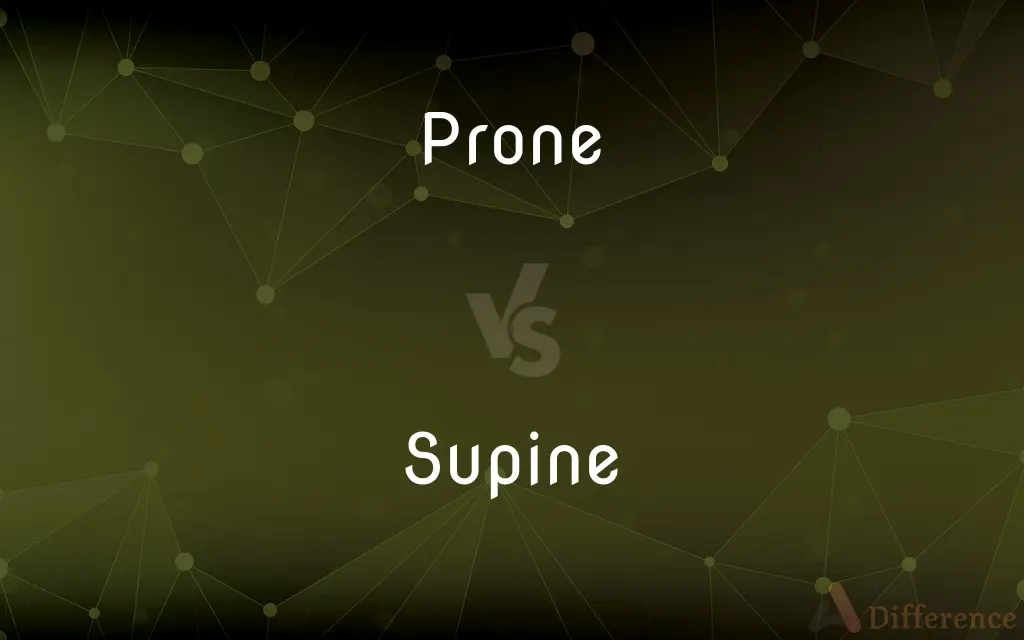Prone vs. Supine — What's the Difference?
Edited by Tayyaba Rehman — By Fiza Rafique — Updated on October 12, 2023
Prone refers to lying face down, while Supine means lying face up.

Difference Between Prone and Supine
Table of Contents
ADVERTISEMENT
Key Differences
The terms Prone and Supine are primarily used to describe positions of the human body. When one is lying Prone, they are face down, with their chest and stomach touching the ground or surface. Alternatively, a person in a Supine position lies on their back, facing upwards.
Think of how one might lie on the beach to get a tan; they start Prone to tan their back and turn Supine to tan their front. When discussing anatomy or medical procedures, it's essential to understand these positions.
If a doctor says to lie Prone, they mean to lie face down. If they recommend lying Supine, they're asking the patient to lie on their back.
Comparison Chart
Definition
Lying face down
Lying face up
Orientation
Chest and stomach touch the surface
Back touches the surface
ADVERTISEMENT
Example Usage
"He was found prone on the floor."
"She lay supine, staring at the ceiling."
Associated Actions
Sunbathing back, push-ups
Sunbathing front, bench press
Physical Position
Anterior side down
Anterior side up
Compare with Definitions
Prone
Susceptible to something, especially an illness.
She's prone to colds during winter.
Supine
Not resisting or opposing.
A supine acceptance of the decision.
Prone
Having a natural inclination or tendency.
He's prone to accidents.
Supine
Lying on the back with the face upwards.
He was resting in a supine position.
Prone
Likely to suffer from or experience something regrettable.
He's prone to making mistakes under pressure.
Supine
Showing lethargy or indifference.
The government was supine in its response.
Prone
Bent forward; inclined.
The tree was prone due to the wind.
Supine
In a position of comfort or rest; inactive.
He was supine on the couch all day.
Prone
Lying face downwards.
The man was prone on the grass.
Supine
In grammar, a supine is a form of verbal noun used in some languages. The term is most often used for Latin, where it is one of the four principal parts of a verb.
Prone
Likely or liable to suffer from, do, or experience something unpleasant or regrettable
He was written off by many as too injury-prone
Farmed fish are prone to disease
Supine
(of a person) lying face upwards.
Prone
Lying flat, especially face downwards
A prone position
I was lying prone on a foam mattress
Supine
Failing to act or protest as a result of moral weakness or indolence
The government was supine in the face of racial injustice
Prone
Lying with the front or face downward.
Supine
A Latin verbal noun used only in the accusative and ablative cases, especially to denote purpose (e.g. mirabile dictu ‘wonderful to relate’).
Prone
Having a tendency; inclined. Often used in combination
Paper that is prone to yellowing.
An accident-prone child.
Supine
Lying on the back or having the face upward.
Prone
In a prone manner
The patient was lying prone on the bed.
Supine
Having the palm upward. Used of the hand.
Prone
Lying face downward.
Prone position
Supine
Marked by or showing lethargy, passivity, or blameworthy indifference
"No other colony showed such supine, selfish helplessness in allowing her own border citizens to be mercilessly harried" (Theodore Roosevelt).
Prone
Of the hand, forearm or foot: turned facing away from the body; with the thumb inward or big toe downward.
The hand is in the prone position typically when using a keyboard; and the forearm is then also in the prone position; when the foot is resting on the inner side of the sole, it is in the prone position.
Supine
In Latin grammar, a verbal noun used in only a few syntactic constructions and occurring in only two cases, an accusative in -tum or -sum and an ablative in -tū or -sū. The accusative form of the supine is sometimes considered to be the fourth principal part of the Latin verb.
Prone
Having a downward inclination or slope.
Supine
Lying on its back.
Prone
(figuratively) Predisposed, liable, inclined.
Prone to failure
Supine
(of the hand, forearm or foot) turned facing toward the body; with the thumb outward or the big toe upward.
When one is washing one’s face, the hand is in the supine position; and then the forearm is also in the supine position; when the foot is resting on the outer side of the sole, it is in the supine position
Prone
(medicine) To place in a prone position, to place face down.
Supine
(figuratively) Reluctant to take action due to indifference or moral weakness; apathetic or passive towards something.
Prone
Bending forward; inclined; not erect.
Towards him they bendWith awful reverence prone.
Supine
Inclining or leaning backward; inclined, sloping.
Prone
Prostrate; flat; esp., lying with the face down; - opposed to supine.
Which, as the wind,Blew where it listed, laying all things prone.
Supine
In Latin and other languages: a type of verbal noun used in the ablative and accusative cases, which shares the same stem as the passive participle.
Prone
Headlong; running downward or headlong.
Supine
In Swedish, Faroese, Icelandic and Old Norse: a verb form that combines with an inflection of ha/hafa/hava to form the present perfect and pluperfect tenses.
Prone
Sloping, with reference to a line or surface; declivous; inclined; not level.
Since the floods demand,For their descent, a prone and sinking land.
Supine
(obsolete terminology) The 'to'-prefixed infinitive in English or other Germanic languages, so named because the infinitive was regarded as a verbal noun and the 'to'-prefixed form of it was seen as the dative form of the verbal noun; the full infinitive.
Prone
Inclined; propense; disposed; - applied to the mind or affections, usually in an ill sense. Followed by to.
Poets are nearly all prone to melancholy.
Supine
Lying on the back, or with the face upward; - opposed to prone.
Prone
Lying face downward
Supine
Leaning backward, or inclining with exposure to the sun; sloping; inclined.
If the vineOn rising ground be placed, or hills supine.
Prone
Having a tendency (to); often used in combination;
A child prone to mischief
Failure-prone
Supine
Negligent; heedless; indolent; listless.
He became pusillanimous and supine, and openly exposed to any temptation.
Supine
A verbal noun; or (according to C.F.Becker), a case of the infinitive mood ending in -um and -u, that in -um being sometimes called the former supine, and that in -u the latter supine.
Supine
Lying face upward
Supine
Offering no resistance;
Resistless hostages
No other colony showed such supine, selfish helplessness in allowing her own border citizens to be mercilessly harried
Supine
Facing upwards.
The palms of her hands were supine.
Common Curiosities
How can I remember the difference?
Think "Prone is like prostrate" (lying down) and "Supine is like 'soup-in', lying back to sip soup."
Can Prone refer to a natural tendency?
Yes, Prone can refer to a natural inclination or tendency to something.
Which means to lie face up?
Supine means to lie face up.
Is Supine always about body position?
No, it can also mean lethargy, indifference, or a lack of resistance.
Which position is Prone?
Prone is the position of lying face down.
Can you be Prone to emotions?
Yes, like being "prone to anger" means having a tendency to get angry easily.
Are these terms used in medical contexts?
Yes, they often describe body positions in medical examinations or procedures.
Is Supine related to "support"?
No, they're not directly related but think of Supine as lying back, supported by the ground.
What's the opposite of lying Supine?
The opposite is lying Prone.
Can animals be described as Prone or Supine?
Yes, these terms can describe any creature's orientation, though they're most commonly used for humans.
If I'm doing a push-up, which position am I starting in?
You start in a Prone position.
Is lying Supine good for relaxation?
Yes, many relaxation exercises start with lying Supine.
Do these words have roots in Latin?
Yes, "Prone" comes from the Latin "pronus", meaning forward or face down, and "Supine" from "supinus", meaning backward or lying back.
Which position is better for CPR?
The Supine position, as the person needs to be lying on their back.
How can I use Prone in a sentence?
"She's prone to forgetting her keys."
Share Your Discovery

Previous Comparison
Boon vs. Bane
Next Comparison
Seed vs. PitAuthor Spotlight
Written by
Fiza RafiqueFiza Rafique is a skilled content writer at AskDifference.com, where she meticulously refines and enhances written pieces. Drawing from her vast editorial expertise, Fiza ensures clarity, accuracy, and precision in every article. Passionate about language, she continually seeks to elevate the quality of content for readers worldwide.
Edited by
Tayyaba RehmanTayyaba Rehman is a distinguished writer, currently serving as a primary contributor to askdifference.com. As a researcher in semantics and etymology, Tayyaba's passion for the complexity of languages and their distinctions has found a perfect home on the platform. Tayyaba delves into the intricacies of language, distinguishing between commonly confused words and phrases, thereby providing clarity for readers worldwide.














































